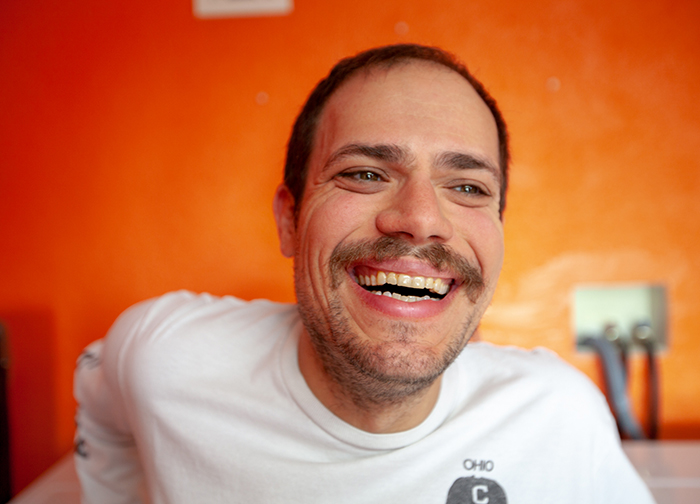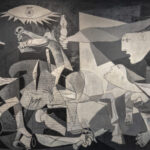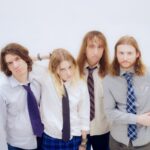Interview: Jeff Rosenstock
Posted: by The Alt Editing Staff
 Photo by Christine Mackie
Photo by Christine Mackie
NO DREAM, Jeff Rosenstock’s newest LP, follows up where 2018’s POST- left off. Channeling his anxious energy into gigantic hooks, Rosenstock writes songs that are as catchy as they are relatable. More than on previous records, NO DREAM finds Rosenstock examining his own faults—tracks like “NO TIME” and “Old Crap” feature some of the most unflinchingly honest lyrics in his entire discography. I spoke with Rosenstock about the making of NO DREAM, the importance of Neil Young, working with Jack Shirley, and more.
The Alternative: Have you picked up any new hobbies during quarantine? I know a lot of people who’ve started making bread for the first time…
Jeff Rosenstock: No! I can’t find any fucking flour.
So you were interested?
Kind of. For me, and I wonder if this is what everyone else’s thought was, but it was like “Okay, we’re going to go into lockdown and there’s going to be no more groceries but I could buy a sack of flour and then I’ll be able to make bread forever, all I’ve got to do is learn how to do it.” Then all the flour was gone so I never learned how to do it.
It also looks like people are having a blast.
Making bread? Oh yeah. I played Animal Crossing and then I very slowly started to hate playing Animal Crossing so that was my big hobby that I picked up.
I played it for maybe a month and it was this wonderful distraction where you could fish and build your own furniture and then I woke up one day and I was like “Yeah, this just isn’t doing it for me anymore.”
It’s gotta be Bunny Day man, all of those eggs. But they weeded out all of us posers who aren’t Animal Crossing lifers, they were like “Yeah, you just like this because of quarantine and it gives you something to do. But what if it was all eggs?”
Exactly. So I know that you’re a Knicks fan..
Ehh, sure.
No?
How are you supposed to be a fan of James Dolan’s team at this point? I think that New York Knicks fans will understand that it is a complicated relationship that we have with our team. But I am a big Nets fan and a big Raptors fan. I got to go to a bunch of Nets games because they’re fairly priced versus Knicks games. Benny, who plays drums in Antarctigo Vespucci, had tickets and we’d often go together so it was cool to watch them become a good team over the past four years, even though they’re kind of throwing it away for superstars. We don’t need to talk about sports, I feel like that’s a deep well for me..
Well, here’s why I asked—another popular quarantine activity was watching the Michael Jordan documentary so I was wondering whether or not you saw that.
Hell yeah, it was great. I was just happy to be watching basketball stuff again. I’m usually working from whenever I wake up to whenever I go to bed on something and my wind down/turn my brain off time has always been watching basketball because you can kind of float in and out of it and there’s enough going on that it’s engaging. So it was just nice to be able to watch some basketball adjacent stuff, even if everything I’ve heard since then was “Well actually, Michael Jordan was lying about this.” Yeah yeah yeah, I know, come on.
There wasn’t a whole lot else going on, it was a fun time.
It was. I never saw Tiger King, which seems to be another thing that everybody watched, but it seems like it was a lot more fun than Tiger King. That’s about, I don’t know, holding tigers captive, kind of? At least a little bit.
I didn’t watch it either.
We’re the only two people who haven’t seen Tiger King.
We should just talk about it. We could speculate about Tiger King for the rest of this interview.
You’ve got to get those clicks for Tiger King.
Did you plan on giving NO DREAM a more traditional album rollout or was the plan always to just drop it whenever it was finished?
The plan was to just drop it but we were going to do it in July and we had a lot of touring planned around it and some other cool stuff, all of which at this point is delayed indefinitely. I just feel like at this point in my life the whole traditional rollout feels like an unnatural thing for me to do. But we were stoked to be touring on this record for like the next year and a half, y’know?
Yeah, that’s a huge part of what your music is, writing these songs that are almost made to be heard live, and then that’s what you go out and do for a very long time.
And our band hadn’t been on tour since February of 2019 so we were really looking forward to going back out there. I don’t know, it feels kind of goofy to have taken a mental health year right before a time where we all have to stay at home anyways. It’s like, maybe my brain could have held on for another year.
So We Cool? sort of feels like the moment where a lot more people started paying attention to what it is that you’re doing.
Yeah, we lucked out.
Do you think that changed the way you were writing songs and making records?
I think it maybe made me do things a little bit slower. I think I’m more careful about what I say, but maybe it’s just that I take longer to write lyrics now because I’m like “Okay, what am I gonna say now that people are actually paying attention to me?” I try to write songs the way that I’ve always been writing songs because I don’t expect for people to be—I never expect when a record comes out for it to do good. So I’m just always trying to write a thing that I think is honest, and that I think would be good and that when we play it and record it our band likes it and it feels good for everyone. That’s always stayed the same, just trying to make something that feels truthful and feels exciting to us.
I like how on this new record you’re kind of pointing the finger at yourself and saying “I’m not immune to any of this shit either.” You talk about buying stuff you don’t need and also how you’re trying to figure out how to make the right decisions in a society based around capitalism, what was the thought process behind that?
It was something that I feel like I’ve been having a hard time coming to terms with over the past two years, which is basically the difference in the way that people were treating me. I feel like I’m in a new spot now where my reputation precedes me in a certain way and I wanted to be more upfront about not being some sort of fucking punk legend, DIY lifer hero, because that feels weird and is an impossible standard to live up to. I think that it was making it hard for me to have conversations with people at shows and it made my social anxiety come back really badly while we were on tour. I felt like I wanted to be able to express on this record like “Hey, I’m kind of a fuck up” in a way that felt honest and if people hear it and think “Oh, this is not the person I thought it was making these records” then that’s cool. It’s like the thought of putting your worst foot forward in a relationship in a lot of ways, or just being upfront and truthful about my flaws instead of trying to present myself as this anti-capitalist whatever. It’s just me trying to present myself as a person on all sides, not just the sides that seem cool or whatever to a small amount of people who like ska [laughs].
Neil Young seems to be someone that frequently pops up in your interviews, you and Laura Stevenson even recorded an EP of Neil Young covers last year. Why do you think he’s such an important songwriter to you?
He writes a lot of good music and he’s also writing from an honest point of view. He’s very fiery against big business shit which I obviously relate to and I think it’s cool for an artist that’s as big as Neil Young is to take so many super punk risks in his career. Whether it’s putting out Trans, that synthesizer and vocoder record he made, or putting out Tonight’s the Night, or even him just holding on to Homegrown for so long and being like “Yeah, this is everybody’s favorite record but I just never put it out.” I just think he does really cool stuff but even if he didn’t do all of that I don’t think it would affect how much I like After the Gold Rush or On the Beach or any of the other ones that I like a lot.
You’ve worked on your past four records with Jack Shirley and I don’t know that he’s getting enough credit for his work so I was wondering how exactly does he help bring these projects to life?
First of all, Jack did get nominated for a Grammy in 2019 for Deafheaven’s Ordinary Corrupt Human Love and I think it’s important to see that in print whenever possible because it’s very funny to all of us. I think what Jack brought to the table during We Cool? was encouraging us to play together in a room and to record it as if it was a band practice, and that added so much life to not only that record but also got the four of us confident playing with each other. So with him we know that our band can work on our shit together and make it sound good in practice and then we can just shift locations and go to his studio and he’s going to put up microphones and make us sound good and it’s really as simple as that. He’s not there to get in the way or try and present something that’s dishonest which is where we really meet in the middle, we’re both trying to present an honest document of what’s happening in that room. We’re both fans of when shit’s heavy and distorted and making it sound even more blown the fuck up. Jack’s our buddy, we flew him out to record Thanks, Sorry! for us. He just puts up mics and you play it back and it sounds insane right off the bat, every record I’ve ever made with him was like that.
What role do you think music plays in helping to fix all these things in the world that are messed up?
I was just talking about this, I think about old reggae records and stuff and how they were protest records and even though I was not around for the history of political strife of Jamaica in the 60’s and 70’s it seemed like the music was something that could get everybody together or at least provide some comfort or maybe just provide the feeling that you’re not alone. I don’t know what music will be able to do in terms of uniting people to overthrow our oppressive leaders but I think that it’s definitely helpful to making people feel not crazy for thinking that we need to do that kind of stuff.
And I feel like that sense of community has always been a big part of punk, is that part of what got you into making the kind of music you make?
It was more that I heard the music and it made sense to me. I think about watching Green Day play Woodstock in 1994 on TV. Me and John, who I’ve been in bands with forever, we both had that epiphany where we watched it and were like “This is fucking awesome, everything else is bullshit.” Or even like hearing Operation Ivy and being like “Finally, somebody else also feels this anxiety that I feel inside me that won’t go away.” I feel like I didn’t really find the punk punk community until Bomb The Music Industry was happening.
With all of the things that you have on your plate, I have to imagine that working on the music for Craig of the Creek on top of everything else is extremely challenging. Do you like forcing yourself to work under pressure like that?
I think that I work well under pressure but it’s not something that I really noticed about myself until I was talking to my buddy Tim, who plays drums in my band in Brooklyn sometimes, because I was like “Fuck, I don’t know how I’m going to do this television show” and he was like “You’re going to be able to pull some shit together at the eleventh hour like you always do.” I think that might be why I don’t care about doing album rollouts, because then the whole time I’m just super anxious waiting for it to come out.
NO DREAM is out now via Polyvinyl and free to download from Quote Unquote. For all donations on Quote Unquote, 10% of the proceeds go to Food Not Bombs.
_
Michael Brooks // @nomichaelbrooks
The Alternative is ad-free and 100% supported by our readers. If you’d like to help us produce more content and promote more great new music, please consider donating to our Patreon page, which also allows you to receive sweet perks like free albums and The Alternative merch.










